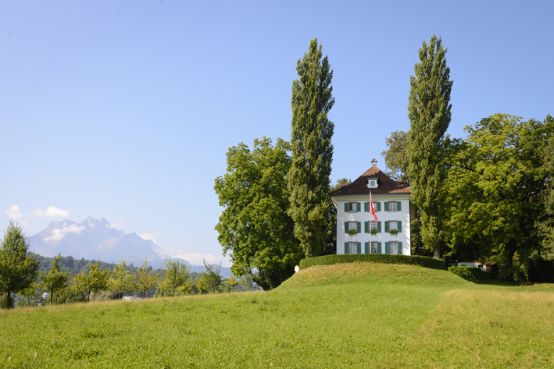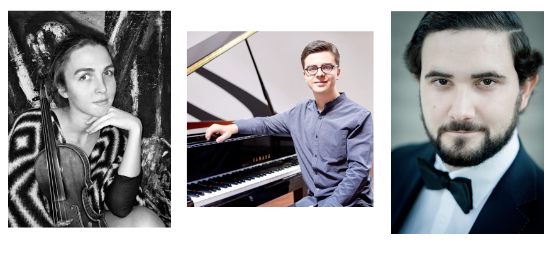Established and upcoming Wagner interpreters
The Swiss Wagner Society enjoys opera in a short format and provides long-term support for young stage artists.

Wagner's monumental opera Tristan and Isolde, performed in three quarters of an hour - is that possible? If you limit yourself to the essentials, are satisfied with a grand piano as an "orchestra" and have a good arranger at your side, then it is indeed possible. The Swiss Richard Wagner Society dared to embark on this adventure on April 21 under the title O sink down ... in the Great Hall of the Zurich Conservatory Music School.
A "collage according to Tristan and Isolde", the semi-staged concept came from John H. Müller, who has been a committed "Wagnerian" for many years. Pianist and composer Edward Rushton, who also sat at the piano, was responsible for the musical arrangement. He quickly proved to be a masterful accompanist who left his mark on the performance with a feeling for dramatic intensification and an unprecedented sense of sound.
Rushton's cuts focused on the essentials: in the first act on the expiatory love potion scene, in the second act on the night of love followed by King Mark's appearance. The third act consisted of a very short Tristan suffering scene and Isolde's love death, which was no less abbreviated. It was certainly not easy for Mona Somm, who sang Isolde with great success in Erl in 2015, to master this version, but she succeeded well. However, her voice seemed a little pressed in the middle register.
Rolf Romei has proven himself at the Theater Basel in the roles of Lohengrin and Parsifal, now he tried his hand at the mini-Tristan. His voice is somewhat unpredictable, at times absolutely top-notch, at other times he has to survive strange breaks, only to continue singing again with aplomb. Martin Snell intervened in the action with force as King Marke: with his carrying bass, however, his singing sometimes seemed somewhat rigid and stentorian.
The event par excellence was Susannah Haberfeld's performance as Brangäne, a role that is tailor-made for the mezzo-soprano. She sang her part with a carrying legato arch and soft-sounding depth, with the admonishing "Habet Acht" as the climax. Here, one would have wished that arranger Rushton had shortened it a little less in order to listen to this wonderful voice for longer.
Insights into the work and festival operations
The audience, the majority of whom were Wagnerians and had even traveled from Freiburg im Breisgau and Vorarlberg, applauded enthusiastically. In contrast to this insider event, however, the Society's statutes stipulate "to make the work of Richard Wagner accessible to a large audience". The Wagner Society pursues an opening, forward-looking aspect through its scholarship system.
Since 1882, the international Richard Wagner Scholarship Foundation has been awarding grants to talented singers, musicians or other stage performers who are considered for the Bayreuth Festival. The scholarships include a free visit to the Festival, a concert at which the scholarship holders demonstrate their skills and attendance at introductory lectures. International winners in the past have included Christian Thielemann, Waltraud Meier, Michael Volle and Anja Kampe, to name but a few.
In 2013, the Swiss Society joined this award and announces the scholarship annually at the music academies. There can also be recommendations. One of the first winners was the pianist Andrea Wiesli, who visited Bayreuth in 2013: "I was very impressed by this historic venue with its special acoustics," she says. "I regularly perform a recital with a former fellow scholarship holder, the mezzo-soprano Stephanie Szanto from Bern, and I am also invited to give recitals on Wagner's Erard grand piano in Tribschen."
Last year, Serafin Heusser, who was recommended by his lecturer Peter Brechbühler, was one of the scholarship holders. He also raves: "Attending the performances and the guided tour of the Festspielhaus was a unique and very interesting experience for me! In other opera houses, I always had the feeling during Wagner performances that the singers had to fight against the orchestra and could never sing piano. So it was all the better for me that Michael Volle, for example, was able to sing beautiful mezza voce notes thanks to the brilliant acoustics."
This year's selection of winners, who will give their scholarship concert at Schlössli Wartegg in Lucerne on May 26, shows just how meaningful this scholarship is. Violinist Lisa Rieder will perform Beethoven's Kreutzer Sonata, accompanied by Luka Hauser. Hauser will also interpret Scriabin's 4th Piano Sonata, peppered with Tristan chords, and accompany the tenor Omar Kobiljak. The latter recently performed successfully at Zurich Opera House as Steuermann in Wagner's Dutchman stepped in.
-

- Performers at the next scholarship holders' concert (from left): Lisa Rieder, Luka Hauser, Omar Kobiljak. Photo: zVg








